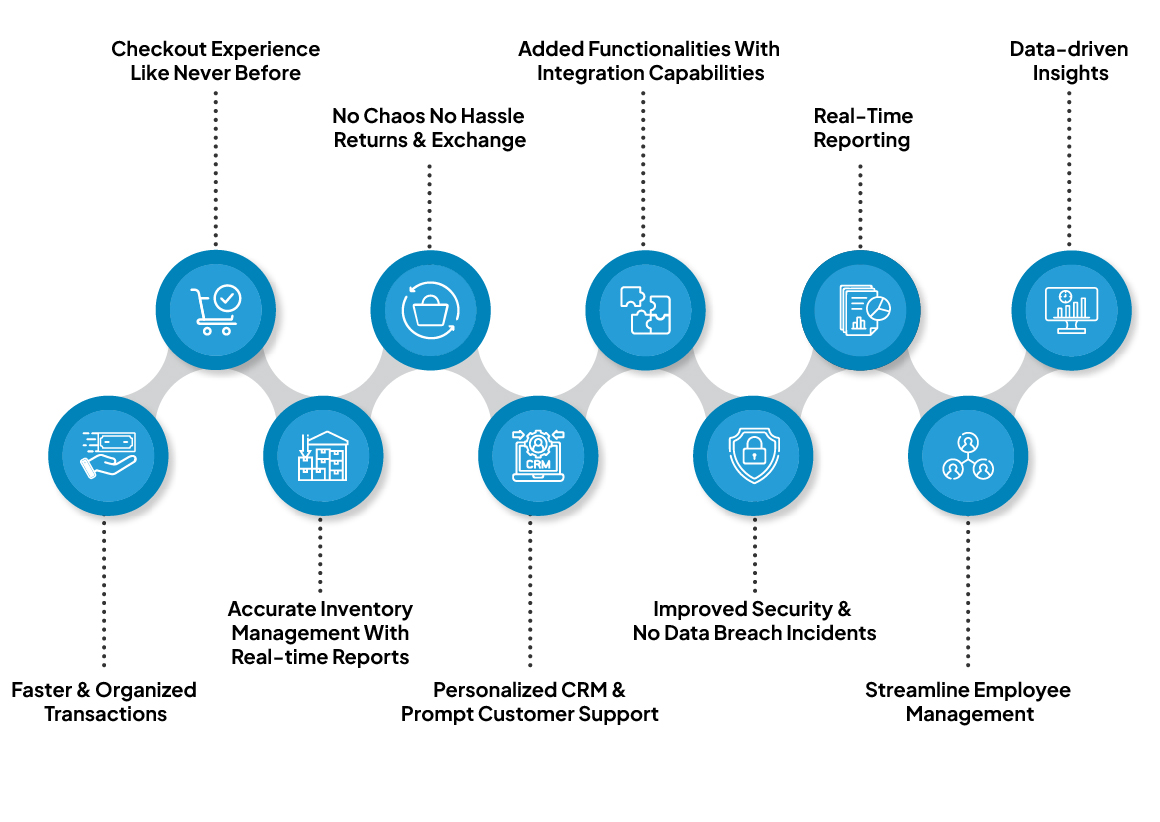The Importance of POS Software in Retail: 10 Key Benefits
September 5, 2023

The retail and supermarket businesses are constantly transforming. Retailers have onboarded the online bus and have already digitalized most of their everyday operations. Retailers also know that staying efficient and organized with payment handling at the point of sales is critical to keeping customers happy and reducing wait lines at billing counters. Point of Sale (POS) software has become a fundamental tool for achieving this and replacing overly time-consuming and outdated methods like traditional cash registers and manual inventory management.
Point-of-sale software brings dramatic changes in the way retailers can do their business and keep everything from inventory management to customer communication centralized. The benefits and Importance of POS software are immense and if you own a retail shop and still have not implemented a cloud-based POS system, it’s high time you do it. Supermarkets having legacy POS systems should also migrate to cloud-based POS systems to keep themselves up to date with the latest retail technologies.
This blog explores the ten essential benefits of utilizing POS software in the retail field, uncovering its huge potential to revolutionize business processes.

An omnichannel retail POS software can be deployed on a desktop, laptop, tablet, mobile, kiosk, or any POS terminal. Retailers ranging from grocery stores, garment shops, Pet shops, and hardware stores to supermarkets and large-scale retail chains can enjoy the many benefits of POS software.
| Such is the impact of a POS system, that it is expected to grow at a CAGR of 10.8% between 2023-2030 globally. |
Below are the top 10 benefits of a retail POS solution:
The core of every retail operation is the ability to process transactions accurately and swiftly. The POS software provides businesses with a streamlined solution for managing sales, processing payments, and providing instant receipts. It helps with the following:
The checkout experience is one of the crucial touchpoints that influence customer perception. In addition to mobile payments and self-checkout, modern POS for supermarkets offers a variety of payment options, enhancing convenience and reducing friction. It can lead to positive word-of-mouth and higher customer retention can result. Furthermore, the following features of POS software enhance the checkout experience:
Manual inventory management can be time-consuming and can also lead to errors. Point-of-sale software automates inventory management by tracking sales and restocking immediately since it provides real-time insights into stock levels, eliminating the headaches associated with manual inventory tracking.
In this way, financial losses are reduced and popular items are always available to customers, reducing overstocking or understocking.
Returns and exchanges are a vital part of retail, but they can be challenging to manage. In addition to automating return transactions, POS software tracks reasons for returns and updates inventory levels accordingly. Providing a hassle-free returns experience not only saves time but also improves customer satisfaction.
Knowing your customers is key to building lasting relationships. POS software often comes with CRM features that allow businesses to store customer information, purchase history, and preferences. Individual shoppers are able to benefit from personalized interactions, targeted promotions, and loyalty programs.
Modern POS for retail stores integrates seamlessly with other business systems, such as accounting, e-commerce, WhatsApp, Payment Gateways, etc. in today’s interconnected digital landscape. By integrating all channels, data discrepancies are reduced and a cohesive customer experience is provided.
Retail businesses can suffer reputational damage and customer trust when their security is breached. A POS system incorporates security features such as encryption, user access controls, and compliance with industry standards (such as PCI DSS), protecting customer information and payment information.
Here’s how a POS for a retail store enhances security:
Making informed decisions requires timely access to business insights. In order to react quickly to changing market conditions and optimize their strategies on the fly, retailers can leverage POS software that offers real-time reporting features offering a snapshot of sales, inventory, and other key metrics. A POS for retail store offers real-time reporting due to the following features:
Staff management is essential to operational efficiency. POS software facilitates employee scheduling, tracks working hours, and monitors performance. By reducing the workload, evaluating employee performance, calculating payroll, and managing shifts, valuable time can be freed up.
Modern retail is all about data, and POS software is a treasure trove of valuable insight. As businesses capture and analyze sales data using POS software, they can identify trends, customer preferences, and buying patterns. Retailers can use this data-driven approach to develop effective marketing strategies, make informed decisions, and customize their offerings accordingly.
POS software is becoming a necessity owing to its ability to efficiently manage transactions, customize customer interactions, inventory optimization, and its ability to assist in making a data-driven decision.
If you are wondering where can you start with your POS journey, we, at VasyERP can be your trusted partner. Our comprehensive and user-friendly POS system will act as an extension of your business and will help you manage different aspects of your business- from inventory to sales with ease.
Reach out to our POS experts or mail us at sales@vasyerp.com or call us at +91 8140364036.

If you are looking for desktop software or mobile appli...
August 8, 2023

Ease Your Retail Business Operations with the Smart Vas...
July 17, 2023
